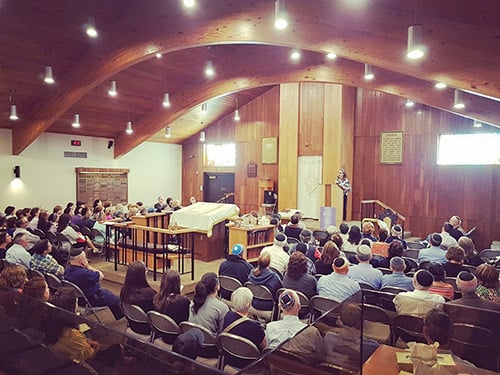
During the course of Shabbat Shuva weekend, September 14-16, the OU Women’s Initiative featured Israeli journalist, primetime news reporter, publicist and TV and radio anchor Sivan Rahav-Meir at five venues within the New York/New Jersey areas. The Teaneck community gathered in large numbers to hear Rahav-Meir explore “21st Century Teshuva: A Synergy of Media and Meaning” on Sunday morning, September 16, at Congregation Bnai Yeshurun.
As a media “superstar,” Rahav-Meir attracts a huge following in the national religious sector of Israel and now the Diaspora. Her blogs are followed by thousands as are her daily WhatsApps and weekly parsha shiurim, through which she inspires the religious community with her journey to Judaism and its contemporary issues. As a news reporter for TV and radio, she is constantly in the spotlight and fully comprehends her need to balance her media role with that of a religious young woman.
For Sivan-Rahav, the Yamim Noraim convey a special and “heavy” message to us in our media-saturated world. Living at a time when every personal act can easily be scrutinized online by hundreds, we must be wary that we are not swayed off the authentic Torah path by the myriad distractions of the online world. Citing Rav Shimshon Raphael Hirsch, 19th-century German rabbinic leader, commenting on the “seh l’azazel” or “lamb to the wilderness,” we have the arduous choice of choosing God while the choice for “azazel” is before us at all times. We must be strong in resisting the “wilderness” opportunities so easily available to us through the onslaught of the media.
In exploring the meaning of one of the key words of this period, teshuva, Rahav-Meir opted for the interpretation of Reb Zusha of Anipoli. Utilizing the initial letters of the word teshuva, Rahav-Meir presented the phrases from Tanach and liturgy, which illustrate the method of achieving true repentance.
For the “taf” of teshuva, the pasuk “tamin t’hiye im Hashem Elokecha, You must be wholehearted with the lord your God,” urges us to be clean, honest and truthful in our faith. In this we should emulate the authenticity and purity of an infant who reflects honestly what he/she feels.
For the “shin,’ the phrase “Shiviti hashem l’negdi tamid, I have placed God before me at all times,” urges us to be mindful of God’s presence in all locations, not just in the house of prayer or study. At this point, Rahav-Meir recounted the story of the rare interview she was granted with the Sharanskys, Natan as well as the media-shy Avital, on the occasion of Natan’s receipt of the prestigious Israel Prize. The portion of the interview that Rahav-Meir omitted, which she greatly regrets to this day, held the greatest message for today. Sharansky shared that he is not the hero of the Jewish story, but the current generations are. He explained that when he was incarcerated in the Gulag, he knew that there existed only two shades, black and white, and the components of each were easily differentiated. Today, out in the real world, there is no such stark differentiation possible as everything comes through in hazy shades of gray. Thus, today’s Jews are the heroes as they are tasked daily with differentiating the white from the black. They must work diligently at keeping the image of Hashem constantly before their eyes. It is not easy when nobody is chasing you and you have the freedom to choose.
The “vav” in teshuva represents “V’ahavta l’reacha kamocha, And you shall love your fellow as yourself. “The test here is to put the “me” to the side and focus on the other, the “he or she.” In illustrating this credo, Rahav-Meir cited a recent study by the creators of Waze. They surveyed users to find out why they preferred Waze to Google Maps. Many responded that Waze was friendlier. Obviously, one of the goals of today’s apps is to be user-friendly. Rahav-Meir warns about the trend to treat our apps like people at the cost of treating people less like people.
For the “bet,” the phrase “Bechol derachecha da’ehu” was selected, meaning “Know Him in all your ways.” As a religious woman working in media, Rahav-Meir has confronted challenges in which people with questionable Jewish behaviors are lionized regardless of their “sins.” She herself had to face this challenge when she was expected to interview a famous Israeli singer whose daughter had just become engaged to a world-famous filmmaker, a non-Jew. She felt that a positive interview with him would be using her as a tool for promoting values that conflict with authentic Judaism.
Finally, the “heh” represents “Hatznea lechet im Elokecha, Walk humbly with your God.” Rahav-Meir referred to the blessing Bilam was forced to give to Bnei Yisrael, commenting on their tzniut, modesty. The openings in their tents were placed in ways that nobody’s privacy would be violated. Said Rahav-Meir, “We should create islands of privacy in our world as opposed to taking endless selfies of our every move. Our world should be focused upon our internal accomplishments and they should give proper meaning to our daily lives.”
In the U.S., to receive the daily WhatsApps by Sivan Rahav-Meir, text David Schlacht at 202-468-3450.
By Pearl Markovitz










